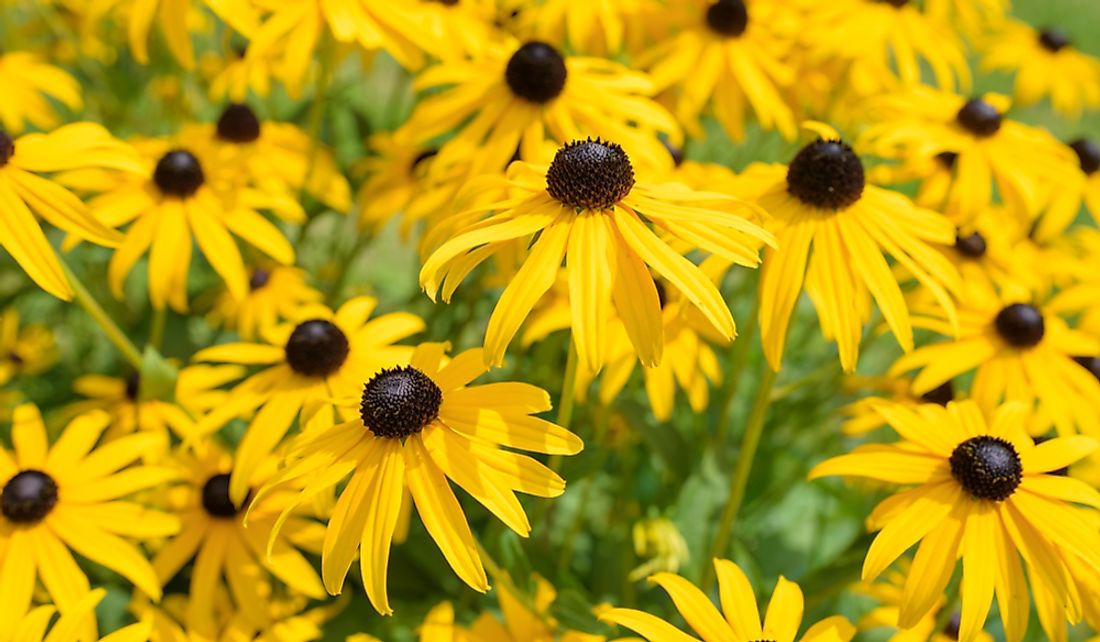What Is The State Flower Of Maryland?

Maryland is a US state located in the country's Mid-Atlantic region. Incorporated into the Union on April 28, 1788, Maryland became the 7th US state and is named in honor of English queen, Henrietta Maria, who was referred to in England as Queen Mary. The state of Maryland has several nicknames including the "Free State", "Old Line State", and "Chesapeake Bay State." The capital city of Maryland is Annapolis. In addition to its flag, the state has several symbols, including a state bird (Baltimore oriole), state tree (white oak), and state horse (thoroughbred). Like all 50 US states, Maryland also has a state floral emblem. The state flower of Maryland is the black-eyed Susan, officially named Rudbeckia hirta.
State Flower of Maryland
Designated the official state flower in 1918, the black-eyed Susan is a common flower in Maryland and can be found growing almost everywhere in the state. It is particularly common along the roadside and in fields throughout the state. In some places, the plant bearing the beautiful flower is considered a weed and may be cleared away when preparing land for agriculture. However, the flowers are often adored and considered ornamental. Additionally, the presence of black-eyed Susans along roadsides are considered a symbol welcoming visitors to the state.
Selection Process
The choice for a state flower was inspired by the 1893 World’s Fair, which was held in Chicago. The fair also motivated several other US states to select an official flower. A group of women from the Maryland Agricultural College led the campaign for the state to have a state flower. The public overwhelmingly supported their choice, the black-eyed Susan. A bill was presented to the General Assembly supporting the establishment of the flower as the state floral emblem. In 1918, the black-eyed Susan was officially designated Maryland's state flower.
Brief Description
The black-eyed Susan is a species of flowering plant belonging to the family Asteraceae. Its botanical name, Rudbeckia hirta, was given in honor of Swedish botanist Olaus Rudbeck, a professor of botany at Sweden's University of Uppsala. The plant has several other nicknames including brown-eyed Susan, golden Jerusalem, yellow ox-eye daisy, and brown Betty. The plant flowers at the end of second growing season and forms a short disc flower in the center of the head. The black-eyed Susan is a rough hairy perennial coneflower. Its flowers are yellow rays circling a dark brown or black spherical center measuring approximately 3 inches in diameter. The flower blooms between May and August and has 13 petals. The plant itself can grow up to two feet tall and has narrow toothed leaves that are placed alternately on the stem. The colors of the black-eyed Susan, black/brown and yellow, also appear on Maryland's state flag.
Habitat
The black-eyed Susan grows easily with little attention. They often grow in abundance in the wild, making it a favorite flower of wildflower photographers. The plant thrives in areas with high temperatures and direct sunlight, and are common in meadows, pastures, and fields. The black-eyed Susan grows and thrives in undisturbed habitats, but can also survive under cultivation. In Maryland, the flower is commonly found along the roadside, and are placed on the winning horse of Baltimore Maryland's Preakness Stakes horse race.











